2013-14 NHL Awards: Runaway MVP Sidney Crosby & tight trophy races
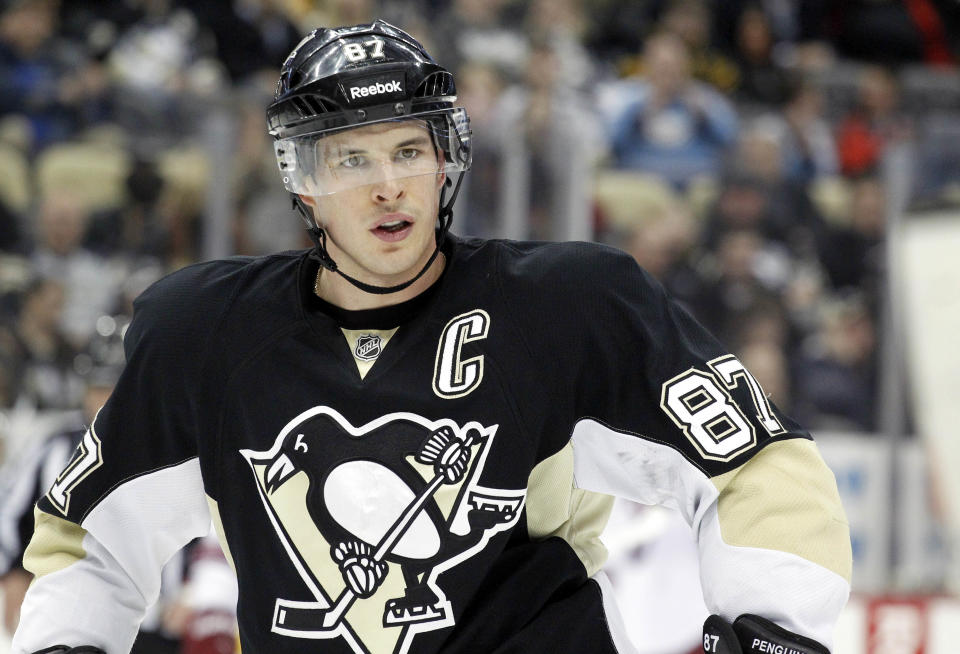
Sidney Crosby vs. Alex Ovechkin? No controversy this year. Though Ovechkin lit the lamp 51 times and won the Rocket Richard Trophy as the NHL’s leading goal-scorer, he was minus-35, third-worst in the league. His Washington Capitals didn’t make the playoffs, and he won’t make many awards ballots.
So how about Drew Doughty vs. Duncan Keith instead? Or Semyon Varlamov vs. Tuukka Rask? Or Patrice Bergeron vs. Anze Kopitar? Or Nathan MacKinnon vs. the two rookies from Tampa Bay? Or Mike Babcock vs. Patrick Roy? With one exception, every honor came with a hot debate or at least a tight race. My picks:
HART TROPHY (most valuable player): Sidney Crosby, Pittsburgh Penguins
Whichever definition you use – the liberal “best player” or the literal “most valuable to his team” – Crosby should win the Hart hands down. The Penguins led the NHL in man-games lost to injury. But their captain stayed healthy for a full season for the first time since 2009-10, and he carried the team to the second-best record in the Eastern Conference.
Crosby produced 104 points and won the Art Ross Trophy as the NHL’s scoring champion, factoring into almost 43 percent of the Penguins’ non-shootout goals. No one else cracked 90 points. The next-closest in the scoring race was Anaheim Ducks captain Ryan Getzlaf with 87. The 17-point margin of victory was the largest since 1998-99, when the Penguins’ Jaromir Jagr beat the Ducks’ Teemu Selanne by 20.
Right winger Pascal Dupuis went down with a knee injury in December, so Crosby did it skating with replacements like Brian Gibbons and Lee Stempniak. He faced top competition shift after shift and played an all-around game. One measure of the load he carried: No. 87 took 1,887 faceoffs, 104 more than anyone else in the league.
Runners-up:
— Semyon Varlamov, Colorado Avalanche: The Avs vaulted from worst to second-best in the West largely because of Varlamov. They were a poor possession team and allowed 32.7 shots per game, 25th in the NHL. But Varlamov had a .927 save percentage, second among goalies who played at least 30 games.
— Ryan Getzlaf, Anaheim Ducks: Getzlaf was the best player on the top team in the stronger conference. He played against top competition in all situations, and he led the league in even-strength points per 60 minutes with 3.15. Linemate Corey Perry was second with 3.00.
Honorable mentions: Ben Bishop, Tampa Bay Lightning; Claude Giroux, Philadelphia Flyers.
NORRIS TROPHY (best all-around defenseman): Drew Doughty, Los Angeles Kings
Duncan Keith is the favorite. But consider a couple of things: The Chicago Blackhawks often used the pair of Niklas Hjalmarsson and Johnny Oduya against top competition, taking pressure off the pair of Keith and Brent Seabrook. Of Keith’s 61 points, which ranked second among defensemen, 35 were secondary assists.
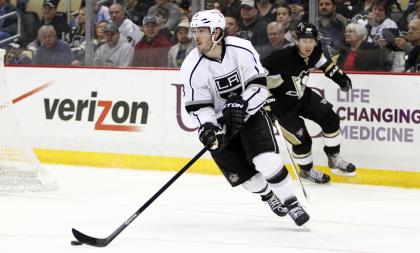
Doughty faced tougher competition. He started a little more of his even-strength shifts in the defensive zone (29.3) than Keith (26.7). He had a 5-on-5 Corsi percentage of 58.5, meaning the Kings took 58.5 percent of the shots when he was on the ice. The only defenseman in the NHL with a better number was a guy who benefitted from him, his partner, Jake Muzzin. Keith was at 56.6. The Kings were the best possession team and the best defensive team in the NHL, allowing only 2.05 goals per game.
Meanwhile, Doughty had more goals (10) than Keith (six). He had virtually the same number of primary assists (19) as Keith (20), but he had only eight secondary assists. So if you take out secondary assists, he has better offensive statistics than Keith’s. In other words, if his teammates had put the puck in the net – the Kings ranked 26th in goals per game, while the Blackhawks ranked second – his brilliance would have been more obvious.
Runners-up:
— Duncan Keith, Chicago Blackhawks: Keith still had a hell of a year. He was a key cog in the Chicago machine. He used his skating to take time and space from opponents – not to mention the puck – and he used his passing to get the puck up to the Blackhawks’ speedy, skilled forwards. He quarterbacked a top-10 power play.
— Zdeno Chara, Boston Bruins: Chara is the most fearsome defensive defenseman in the NHL and drives possession. But the Norris is supposed to go to the best all-around defenseman, and offense matters. He had 17 goals and 40 points, but 10 of his goals and 15 of his points came on the power play, when he actually plays forward as a net-front presence.
Honorable mentions: Marc-Edouard Vlasic, San Jose Sharks; Alex Pietrangelo, St. Louis Blues.
VEZINA TROPHY (best goaltender): Semyon Varlamov, Colorado Avalanche
Varlamov played behind a weak blue line and one of the worst possession teams in the NHL. He faced 2,013 shots, most in the NHL. That’s 185 more than the Montreal Canadiens’ Carey Price, 254 more than the Tampa Bay Lightning’s Ben Bishop, 314 more than the Columbus Blue Jackets’ Sergei Bobrovsky and 372 more than the Boston Bruins’ Tuukka Rask.
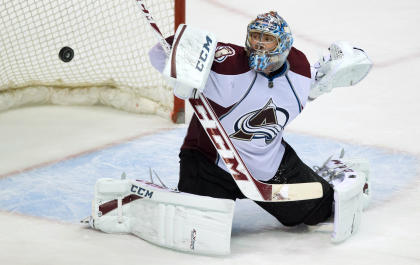
Still, only Rask – who played behind Bergeron, Chara and one of the best possession teams in the NHL – had a better save percentage at .930. Varlamov was right behind at .927, tied for second with Price. If not for Varlamov, the Avs wouldn’t have gone from worst to second-best in the West, and Patrick Roy wouldn’t be a candidate for coach of the year.
Runners-up:
— Ben Bishop, Tampa Bay Lightning: Bishop was right behind Varlamov and Price in save percentage at .924, and he had almost the same impact on the Bolts that Varlamov had for the Avs. If not for Bishop, the Lightning would not have returned to the playoffs, and Jon Cooper would not be a candidate for coach of the year.
— Tuukka Rask, Boston Bruins: A goalie can stop only the shots he faces, and Rask simply stopped a higher percentage of them than anyone else in the NHL. Along with Bergeron and Chara, he was part of the backbone of the second-best defensive team in the league.
Honorable mentions: Carey Price, Montreal Canadiens; Sergei Bobrovsky, Columbus Blue Jackets.
SELKE TROPHY (best defensive forward): Patrice Bergeron, Boston Bruins
Bergeron matched up against top players night after night. He started almost three-quarters of his shifts in the neutral and defensive zones. He was part of a top-10 penalty kill. He took 1,732 faceoffs, fourth-most in the NHL, and won 58.6 percent, third-best in the league. And he had a 5-on-5 Corsi of 61.2, best in the league.
In short, Bergeron took on tough assignments and drove possession. Even though he played in a solid system and had teammates like Chara and Rask, he was a main reason the Bruins ranked second in the NHL in goals-against average (2.08). Not that it matters for the Selke, but he scored 30 goals, too.
Runners-up:
— Anze Kopitar, Los Angeles Kings: The Kings ranked first in the NHL in GAA (2.05) and were the league’s top possession team. Kopitar’s 5-on-5 Corsi was 61.0 percent, second-best in the NHL among forwards, behind only Bergeron.
— David Backes, St. Louis Blues: The Blues ranked second on the penalty kill (85.7), third in GAA (2.29) and they were among the top 10 in possession numbers. Backes started 70 percent of his shifts in the neutral and defensive zones and had a 5-on-5 Corsi of 55.5 percent.
Honorable mentions: Jonathan Toews, Chicago Blackhawks; Sean Couturier, Philadelphia Flyers.
CALDER TROPHY (rookie of the year): Nathan MacKinnon, Colorado Avalanche
MacKinnon was the first pick in the 2013 NHL draft, so he was expected to be pretty good. Still, he’s so fast and skilled, it’s hard to believe he just turned 18 on Sept. 1. He went on a 13-game point streak from Jan. 25 to March 6, breaking the NHL record for 18-year-olds that had been held by Wayne Gretzky.
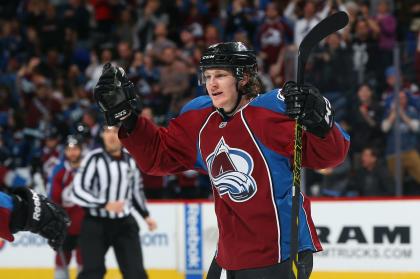
The kid tied for the rookie lead in goals with 24. He led rookies in points with 63. The most amazing thing might be that the race was so close.
Runners-up:
— Ondrej Palat, Tampa Bay Lightning: Palat was drafted in the seventh round in 2011, 208th overall. But at age 23, he broke out with 23 goals, one off the rookie lead, and 59 points, four off the rookie lead.
— Tyler Johnson, Tampa Bay Lightning: Johnson was never drafted. But at age 23, he broke out with 24 goals, tied for the rookie lead, and 50 points, third among rookies. Like Palat, he helped the Lightning replace the offense lost while superstar Steven Stamkos sat out with a broken leg.
Honorable mentions: Torey Krug, Boston Bruins; Hampus Lindholm, Anaheim Ducks.
JACK ADAMS AWARD (coach of the year): Mike Babcock, Detroit Red Wings
Nothing against the Colorado Avalanche’s Patrick Roy and the Tampa Bay Lightning’s Jon Cooper, but they benefitted from goaltending worthy of Vezina and Hart Trophy consideration. And as Ottawa Senators coach Paul MacLean can attest, that can make you look very smart when you have it – and suddenly not-so-smart when it disappears.
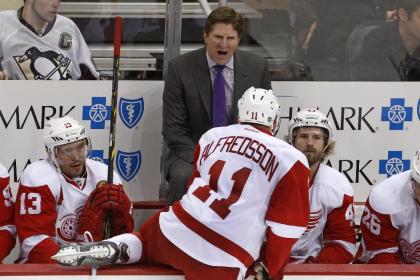
You could argue Babcock benefitted from some good fortune, too. Who predicted Gustav Nyquist’s goal explosion? No one. Not even Babcock, who would have pushed to put him on the opening roster instead of veteran Dan Cleary if he had.
But Babcock extended the Wings’ playoff streak to 23 seasons despite an erosion of talent over the past few years and an injury epidemic this season. While his best players were out – including captain Henrik Zetterberg and dynamo Pavel Datsyuk – he stayed afloat with kids and AHL call-ups. He pushed everyone to compete and play the right way.
Widely regarded as the best coach in the NHL, he has never won the Jack Adams because his teams have been too good to exceed expectations and we have almost taken him and the Wings for granted. After the season in which he passed Jack Adams to become the Wings’ all-time wins leader among coaches, he should finally get his due.
Runners-up:
— Patrick Roy, Colorado Avalanche: Roy brought an upbeat attitude to a downtrodden dressing room, and he brought an up-tempo style to fit the Avs’ personnel. He is more than a Hall of Fame goalie. He is more than a former successful junior coach. He is a student of the game.
— Jon Cooper, Tampa Bay Lightning: Cooper wanted to make the Lightning a better possession and defensive team already. When Steven Stamkos suffered a broken leg, he had to make the Lightning a better possession and defensive team, and he did.
Honorable mentions: Craig Berube, Philadelphia Flyers; Bruce Boudreau, Anaheim Ducks.
(Note: Members of the Professional Hockey Writers' Association vote for the Hart, Selke, Norris and Calder. Members of the NHL Broadcasters' Association vote on the Jack Adams. The NHL's general managers vote on the Vezina.)
MORE NHL COVERAGE ON YAHOO SPORTS:

 Yahoo Sports
Yahoo Sports 
